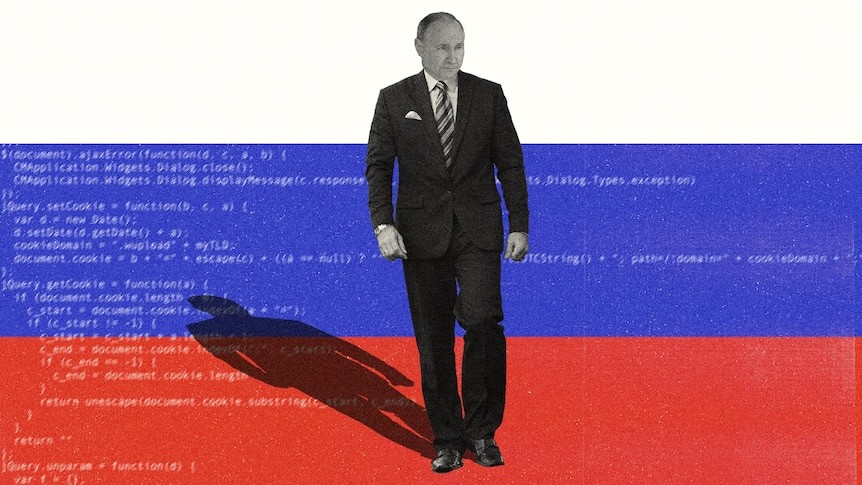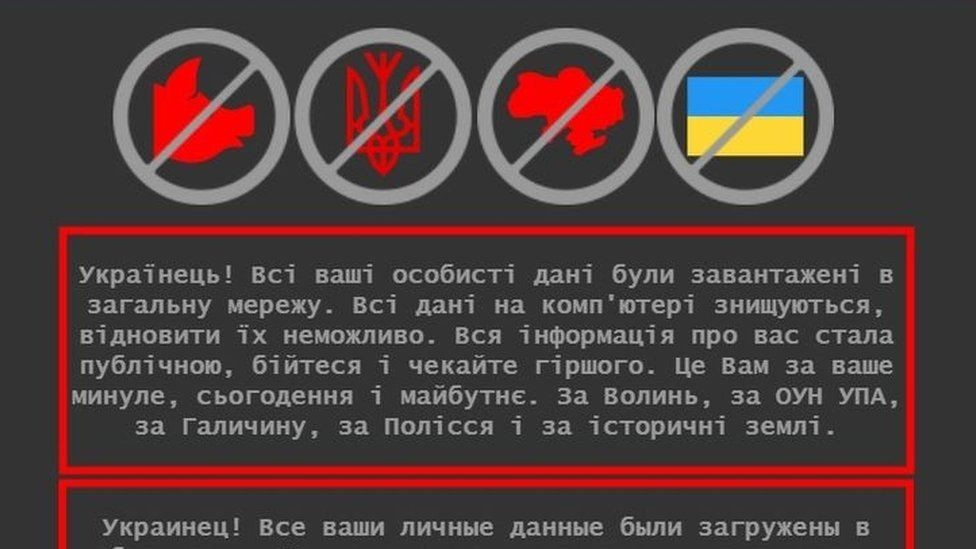On February 24, Russian President Vladimir Putin declared a “special military operation” against Ukraine via television. In the speech, Putin justified the operation as a means “to protect civilians in separatist regions such as Donetsk and Luhansk People’s Republics against the Ukrainian military” and “to fight for the demilitarization and denazification of Ukraine.” After the war on the ground was launched, the battles online, also known as cyberwarfare followed.
 |
| ▲ The Russian government is operating a mass disinformation campaign with its invasion of Ukraine. (Photo from ABC News) |
Spreading false information online is an optimized attack in cyberspace where information spreads quickly. As Ukraine’s Defense Minister Oleksii Reznikov predicted, the Russian government is operating a mass disinformation campaign to justify the invasion. Putin claims that Ukraine is not a nation, but an illegitimate and failed state. He also claims that Ukraine is planning a genocide against ethnic Russians perpetrated by the Kyiv regime, which is also not true. Companies like Google are blocking Russian media access to help Ukraine in their battle against this mass disinformation campaign. On March 1, Google announced that they are blocking and removing the Google News research tool on Russian state-funded publishers such as Russia Today. Kent Walker, Google’s president of global affairs said, “in this extraordinary crisis, we are taking extraordinary measures to stop the spread of misinformation and disrupt disinformation campaigns online.” Meanwhile, in Russia, parliament passed a law banning ‘fake’ news about the military operation to block access to the truth. They banned any rhetoric that labeled the “special military operation” as an ‘invasion.’ Those who spread the so-called fake news can be sentenced up to a maximum of 15 years in prison. Also, the Russian government blocked social media like Facebook and Instagram and accused them of engaging in discrimination against Russian media and information resources.
Hacking is another form of attack during a cyberwar. Concerns regarding hacking became prominent after Ukraine received multiple distributed denial-of-service (DDoS) attacks since the start of the year. Russia is one of the top cybersecurity powerhouses - the country ranked fifth on the Global Cybersecurity Index (GCI) - and there have been multiple claims that the Russian government supports state run hackers. On January 14, the biggest cyberattack in Ukraine in four years took place with as many as 70 government websites temporarily shut down. On February 23, the day before Putin’s speech, Ukrainian banks and government websites went down due to a serious ‘wiper’ tool. Ukraine has since accused Russia of masterminding these DDoS attacks, which they have repeatedly denied.
Ukraine has also launched its own ‘IT Army’ by recruiting volunteer hackers from all over the world in response to the Russian cyberattacks. Ukrainian Vice Prime Minister and Minister of Digital Transformation Mykhailo Fedorov created a channel on the messaging app Telegram and listed 31 major cyber targets, featuring Russian businesses and state organizations. The hacker group ‘Anonymous’ announced on Twitter that they were on board with the cyberwar against the Russian government. Since the announcement, Russia Today has accused Anonymous of the massive DDoS attacks on their website. The most notable hacking-related incident was the airing of Ukrainian music, national symbols, and the hacking of Russian state TV channels to broadcast footage from the war in Ukraine.
 |
| ▲ Threatening messages appeared on Ukrainian government websites after the cyberattack. (Photo from BBC News) |
The Dankook Herald (DKH) interviewed Professor Woo Samuel from Dankook University (DKU)’s Dept. of Industrial Security about cyberwar and the use of cyberattacks. "Cyberattacks are one of the most threatening factors of modern war," Professor Woo explained. This is due to everything being connected through networks, from hospitals, banks, distribution, to traffic systems. This hyper-connected society is controlled by Information and Communication Technology (ICT) to control the daily operations of services we rely upon. In this situation, cyberattacks can incapacitate national infrastructure and paralyze major city systems, which is also its purpose. Professor Woo believes that cyberattacks are a war crime. “Not being offered necessary urgently needed supplies is a serious situation.” Professor Woo was referring to an editorial published by the International Committee of the Red Cross entitled, ‘Even ‘cyber wars’ have limits. But what if they didn’t?’ He quoted an example from the winter storm in Texas, USA in 2021 illustrating what can happen when a nation is dealing with a paralyzed infrastructure system. The remarkable cold wave caused blackouts across the state and access to basic heating and water supplies were halted. People were forced to burn their possessions as firewood to warm themselves. This was not caused by a cyberattack, but it shows what could happen if the national infrastructure collapses and the health and safety of hundreds of thousands of civilians are impacted.
In the case of Korea, Professor Woo said, “Although the risk of hacking cannot be completely eliminated, Korea is managing its cyber security system thoroughly for the national and ICT infrastructures.” Many Korean institutions such as the Electronics and Telecommunications Research Institute and the National Security Research Institute are studying cutting-edge cyber security technologies and it is acknowledged worldwide that we are ranked 4th in GCI.
Cyberwarfare is an inevitable reality in this era when the online world has become as important as the offline world. Attacks are carried out through mass disinformation campaigns or hacking of critical infrastructure sources. It may not be a war with guns and tanks, but everyone must remember that Ukrainian civilian lives are still being impacted by these attacks. The only response is to fight fire with fire.
김혜선, 김주예, 이소연 dankookherald@gmail.com

![[Campus Magnifier] Let's Surf the Library!](/news/photo/202404/12496_1765_4143.jpg) [Campus Magnifier] Let's Surf the Library!
[Campus Magnifier] Let's Surf the Library!
![[Campus Magnifier] Let's Surf the Library!](/news/thumbnail/202404/12496_1765_4143_v150.jpg)





